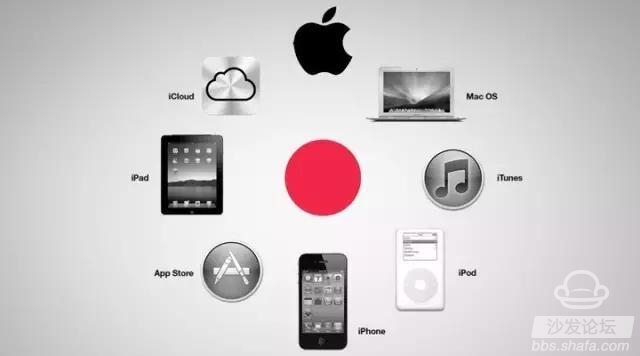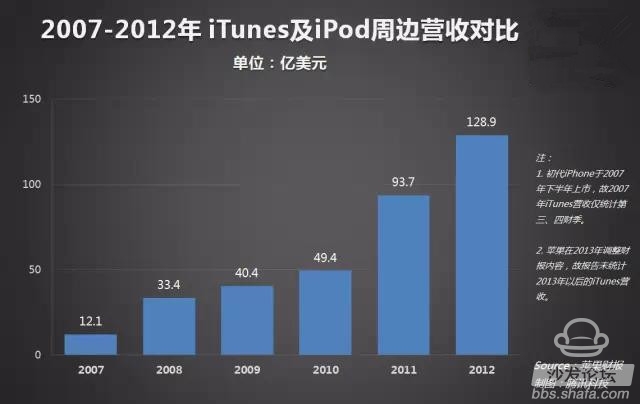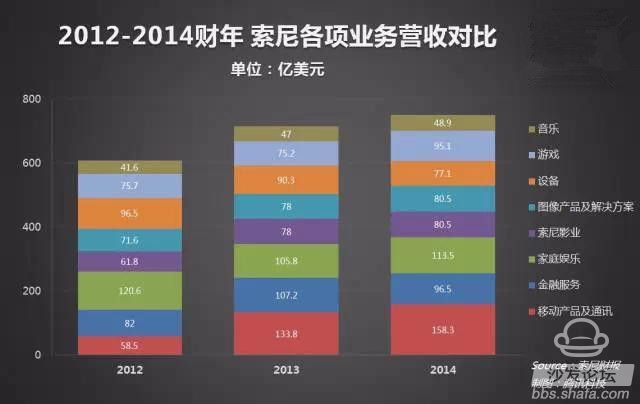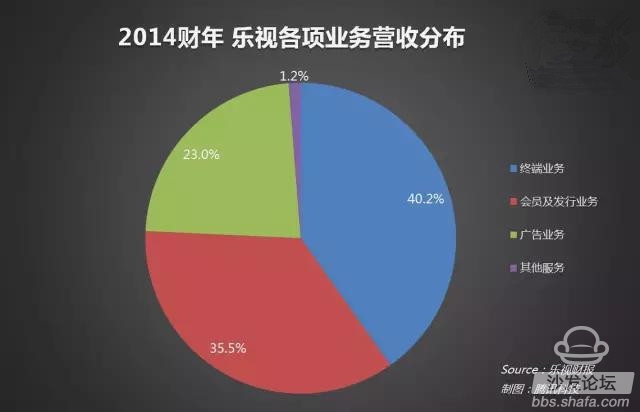
Analysis conclusion:
1. Apple uses the iPhone, iPad, iTunes and other products to form a closed system, through the use of hardware products to drive iTunes content consumption, to obtain long-term gains;
2. Apple's streamlined business line is more likely to form a closed source ecosystem. Sony's business line is too complex to increase the cost of getting through, and it is difficult to form a unified ecology.
3. Based on open source Android, Xiaomi and LeTV are not able to form a closed system like Apple. Their income depends more on hardware. Therefore, both Xiaomi and Leshi are actively investing in content and hardware development to gain more revenue.
Order · They are copying "Apple Mode"
Apple's Q1 financial report for fiscal year 2015 showed that Apple had a total revenue of 74.9 billion U.S. dollars this quarter, of which hardware revenue was 61.7 billion U.S. dollars and iTunes represented service revenue of 4.8 billion U.S. dollars. The proportion of hardware and software in Apple's revenue reached more than 96%, and the unified ecology of Apple's hardware and software has shown amazing commercial value.
Many domestic technology companies are also implementing this business model. In addition to Xiaomi, who has already walked on the road, LeTV also announced at the press conference that it will build its own ecosystem of mobile phones, cars and televisions. In addition to hardware products, the two companies also invested heavily in content, e-commerce, and mobile-related mobile services.
I. Xiaomi Ecology: You can't imagine that it actually invested so many companies
When Xiaomi was founded, Lei Jun initially designed a “Triathlon†strategy for it, namely to unlock the hardware, software, and social services of the mobile market through mobile phones, MIUI, and chat to achieve a unified experience.
However, it is expected that the strategy will not catch up with market changes. "Triathlon" was announced for less than five years. The market where Mi Jing and MIUI were located was occupied by opponents. According to data released by Xiaomi in September last year, the number of users who talked to the Internet was 70 million. However, the number of monthly active users of WeChat exceeded 500 million last year. MIUI's situation is also not optimistic. Last year, the Flash Machine Wizard released statistical data showing that the new bee ROM surpassed MIUI as the third-party system with the largest number of flash machines in 2014.
The triathlon strategy formulated by Xiaomi when he was founded did not go hand in hand, and the mobile phone became the absolute core of Xiaomi. Against this background, Xiaomi is actively deploying a strategic layout around mobile phones, enriching the ecology of many contents such as audio and video, games, and reading, and at the same time deploys smart homes, mobile e-commerce, and also invests in content production and mobile internet services.
1. Content system
- Video: In November 2014, Xiaomi Heshun Capital invested RMB 1.8 billion in Iqiyi and became the second largest shareholder of iQiyi. In the same month, Xiaomi injected millions of dollars into Youku Tudou. The homemade content of Youku Tudou will appear in Xiaomi's hardware terminal in the future. Earlier, Lei Jun personally also participated in investment in film and television production company Huace Film and Television.
- Music: In August 2012, Xiaomi and Baidu Music entered into a content partnership; in January 2015, Xiaomi and Lei Jun’s personal Shunyi Capital Investment Mobile Station applied Litchi FM, which will integrate with MIUI in the future.
- Game: In February 2014, Xiaomi injected US$20 million into Xishanju, a game company, and acquired a 4.7% stake. In addition, Xiaomi also holds a number of shares in the game development company's palmtop technology.
- Read: In November 2012, Xiaomi’s wholly-owned acquisitions were seen, and the latter merged into Xiaomi’s e-reading business. In October 2013, Xiaomi launched the “Mitty Fiction†and entered the online literature market.
2. Smart home and wearable devices
In December 2014, Xiaomi earned a share of 1.29% in the United States with a share of RMB 1.266 billion. In addition, Xiaomi has also successively invested in small ant technology, Zhimi technology, Jiu'an medical and other companies, and launched cameras, air purifiers, and blood pressure monitors.
In January 2014, Xiaomi Heshun invested in Huami Technology, which launched the millet bracelet in July of the same year. In December 2014, Xiaomi invested in US-based wearable equipment maker Misfit.
3. Investment in listed companies
In March 2014, Xiaomi invested in Thunder, and subsequently became the largest shareholder of Xunlei through multiple share purchases. In April of this year, Thunder sold its video service business Thunder to see the future of mobile services and "Crystal Project."
In April 2014, Millet invested 20 million US dollars in Cheetah, which has excellent mobile and overseas resources. Cheetah's fiscal year Q4 financial report showed that mobile revenue accounted for 38% of total revenue and overseas revenue accounted for 24%.
In September 2014, Xiaomi invested $2,500 in "Juan Medical" and obtained a 20% stake.
In December 2014, Xiaomi announced that it will invest USD 1 billion in Jinshan and will focus on the development of Jinshan Cloud Services in the future.
Earlier, Lei Jun also participated in the era of joyful gathering of YY voice parent companies. According to documents submitted to the US SEC in February 2013 in the Gathering Times, Lei Jun’s shareholding has exceeded that of Li Xueling, the founder of Gathering Times, and became the company’s largest shareholder.
4. Investment in consumer services
In July 2013, Shunde made an angel investment in the online housekeeping service “Auntie Gangâ€.
In 2013, Xiaomi invested in a commercial WiFi provider Mai Waidi.
In August 2014, Xiaomi Investment Phone Numbers database "Phone help", the latter database has been integrated into the Xiaomi mobile phone.
In September 2014, Xiaomi and Shunyi invested in the online delivery platform “I have a takeoutâ€.
5. Other services for investment
- E-commerce: In 2007, Lei Jun invested in passengers; in 2011, it invested in mobile e-commerce “pocket shopping†for angel investment. In addition, he has also invested in luxury goods retailers, Shangpin.com, and mobile e-commerce solutions company, Yoke.com.
- Online medical: Earlier, Sun Capital also invested in the medical website "Chaodao Online" and also in 2013 United DCM invested in the medical website Clove Garden.
- Online Education: In December 2013, Shun Capital invested in 51Talk. Shun Wei is also involved in investing in a job network, a good foreign teacher, and Babybus.
- Travel traffic: In August 2011, Shunde Capital invested in an angel angel for the haha ​​carpool; in December 2014, Shunwei invested in the Renminbi car for the used car trading platform.
- Internet Finance: In September 2014, Xiaomi Heshun invested funds in the P2P loan company building blocks, and the block box opened the docking of the Xiaomi account in December. The user can use the Xiaomi account to log in directly. In addition, Xiaomi Heshun also invested in Credit Risk Technology Co., Ltd., and China Mobile Finance Co., Ltd., as well as P2P Credit Company Grassroots Investment.
In addition to the above fields, Xiaomi and Lei Jun personally also participated in investment in real estate hotels, tourism, advertising marketing, infrastructure services and other types of companies.
II. LeTV Eco: Not only mobile phones, TVs and cars that promote
1. Content system
- Video: LeTV, the main video business, was listed in the domestic market in 2010. The 2014 annual financial report showed that LeTV.com's revenue was 6.823 billion yuan last year, and the net profit attributable to shareholders of listed companies was 320 million yuan. In 2011, Levision Holdings, a subsidiary of LeSports Holdings, was established. In September 2014, it declared that round B financing was 340 million yuan, with a valuation of 4.8 billion. In October 2013, LeTV took a wholly-owned acquisition of 900 million yuan for film and television production company's Hua Er movie. Purchase 99.5% equity of LeTV New Media.
- Music: In March 2015, LeTV Music was founded and owned by LeTV.
- Sports: In December 2014, LeTV Sports was delisted from LeTV. In which, LeTV held 60% of shares and LeTV Holdings 15%. In April 2015, LeTV Sports launched its first smart bike.
2. LeTV to New and Cloud Services
- LeTV New: LeTV’s new business includes TV and TV boxes and the corresponding sales platform, LeTV Mall. LeSco’s 2014 financial report shows that the hardware terminal is LeTV's highest revenue last year.
- Cloud Services: LeTV Cloud Services was established in January 2014, of which LeTV.com holds 60% and LeTV Holdings holds 40%.
3. Other business
- LeEco eCommerce: Including Le Life and Net Wine, which are wholly-owned by LeTV Holdings.
- LeTV Wealth: LeTV is wholly-owned.
- LeTV; LeTV Holdings holds shares.
- Other business: Real estate Xincheng Xintai Real Estate and Sibel Communications, which was listed in Singapore in 2007.
III. Millet, LeTV Surface Apple, but more like Sony
The iPhone was initially able to download music and video on the iTunes Store, but in July 2008, Apple introduced a revolutionary App Store that allows iPhone users to purchase games and applications. The income generated by the App Store is divided into three or seven by Apple and application developers.
The App Store complements the application shortcomings in Apple's ecological chain. In addition to the iBook Store launched in 2010 when the iPad was released, Apple successfully formed a content system composed of music, video, books, and game applications. In June 2010, the revolutionary iPhone 4 was released and sold 1.7 million units in the first three days of listing. In 2010, Apple sold a total of 39.99 million iPhones, almost twice as much as a year ago.
iTunes’ revenues have skyrocketed. In 2010, iTunes and iPods brought Apple’s revenue of US$4.94 billion around, an increase of 22.3% year-on-year. In 2011, with the comprehensive distribution of iPhones and iPads and the launch of the white version of the iPhone, Apple Ecology ushered in an outbreak. The revenue generated by iTunes and the iPod around Apple reached US$9.37 billion in 2011, an increase of 89.7%.

Despite the impact of streaming media in recent years, Apple's music download business revenue has declined, but iTunes's overall revenue is still growing at a rate of no less than 10% per year. The reason why iTunes ecology maintains rapid growth lies in the closed ecology that Apple created around hardware. On the one hand, it puts the immense benefits of iPhone, iPad, and iTunes into full play. On the other hand, it encourages users to purchase more hardware products to obtain a superior experience brought by closed ecology.
Asymco analyst Horace Dediu stated in a report released in April 2012 that more than half of iPhone buyers in the United States have been converted from former iPhone users. The iPhone + iTunes ecosystem barriers foster highly loyal users, which in turn lead to a high percentage of repeat purchases.
Apple only focuses on a small amount of hardware. The uncontrollable factors in the integration of hardware and software are reduced as much as possible, and the closed-source ecology is easier to achieve. In contrast, Sony, which also tried to create a unified ecology, failed because of the complexity of its business lines. Looking back at Sony's financial performance over the past three years, even if it is implementing a "one Sony" unified strategy, Sony's different departments are still going their own ways, and equipment revenue is declining year by year. In March this year, Sony CEO Hirai Hirai released a new three-year rejuvenation plan, announcing that he will use profits as the most important assessment indicator to give each business line “greater autonomyâ€. The "One Sony" strategy has failed.

For Android-based technology companies, the challenge of unified ecology lies not only in the integration of different lines of business. Open source Android is also a huge challenge to create closed ecology. However, the extensive layout of Xiaomi and Letv in the ecosystem does not follow the path of Apple. Instead, it has the potential to become the next "Sony army." Fortunately, millet and LeTV are more than the many product barriers Sony has formed over the years. There is an opportunity to better organize the entire hardware layout.
At present, the two Chinese companies still rely more on hardware to drive revenue. The internal documents disclosed by the Wall Street Journal in November last year showed that in 2013, Xiaomi’s full-year revenue accounted for 94% of mobile revenue, while mobile games and other value-added services accounted for only 1% of revenue. LeTV's structure is better, but the 2014 annual financial report shows that the terminal business accounted for 40.2% of the total revenue, which is the largest source of revenue for LeTV last year.

Under this background, millet and LeEco invested heavily in content production and hardware development. The exclusive audio and video resources are conducive to the development of value-added services and the distribution of copyright, and to supplement the shortfall of application revenue; hardware products can extend the sales chain and drive the sales of new hardware through mobile TV and other devices, thereby obtaining more returns.
The immediate problem is that the smartphone bonus is gradually disappearing. IDC's report at the end of last year predicted that the growth rate of the global smart phone market will begin to slow down in the next four years, and the profitability of mobile phones will be greatly reduced - so the next four years will undoubtedly be an important transition period. Apple is currently sparing no effort to promote and sell Apple Watch, in order to obtain new business growth points. As a practitioner of the "Apple model," how does Xiaomi Leshi respond to industry changes in the future?
This content is copyrighted exclusively by SofaNet. Welcome manufacturers to further exchanges and cooperation with us to create more in-depth product reports.

Smart TV box recommended to install sofa butler, download address: http://app.shafa.com/
Sofa Net is an Internet technology company specializing in smart TVs and boxes. It owns popular products such as sofa butlers, sofa tables, and sofa forums. It has been committed to providing high quality application resources for smart TV and TV box users and active community exchanges. And authoritative evaluation of smart TV products.
Bldc Motor,48V Bldc Motor,Bldc Motor 24V,57 Series Bldc Motor
Jinan Keya Electron Science And Technology Co., Ltd. , https://www.keyaservo.com
